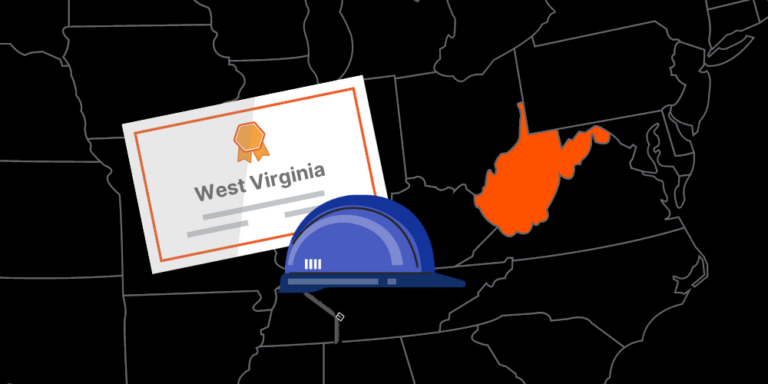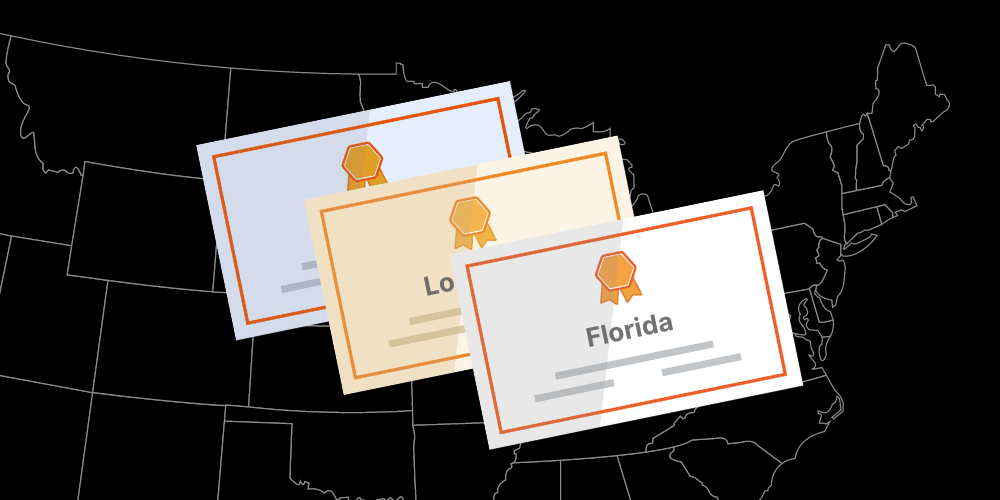— 6 min read
West Virginia Contractor Licensing: Guide to Registration, Requirements, and More
Last Updated Jan 30, 2025
Last Updated Jan 30, 2025

Whether you are a Louisiana resident, or an out-of-state contractor looking to expand into the area, you might be wondering if your business or line of work requires a contractor’s license in West Virginia. The short answer is “most likely” — with a caveat. This article will break down the types, requirements, applications, and exams under Louisiana's contractor licensing rules.
Contracting in a state outside West Virginia? Check out The Ultimate Guide to Contractors License Requirements in Every State.
Table of contents
Who needs a contractor license in West Virginia?
In West Virginia, a contractor is defined as:
Contractors described above must carry state-issued licenses. So must plumbing, electrical, and some other contractors. Those other classifications include:
- Drywall
- Asphalt
- Residential pools
- Caulking
- Finished carpentry
- Window Installation and more
How to get a contractor license in West Virginia
While most contractors in West Virginia need to carry a state-issued license, there are some universal requirements and particular agencies to contact.
Registration
If you own a business of any type in West Virginia, you will have to register with the State’s Tax Department. This includes contractors, subs, specialty trades, handyman businesses, sole proprietors, and self-employed individuals.
Registration is fairly straightforward. You can use the Business for West Virginia website to register with the Tax Department and the West Virginia Secretary of State. This portal has several resources for starting and registering a new business in West Virginia.
General contractor licensing
General contractor licensing is a function of the West Virginia Contractor Licensing Board. Before you’re able to apply for licensing, you need to contact the board and describe your work in order to receive the information on classification and required exams. Once you know what exams you need, the Licensing Board recommends contacting PSI Services, Inc. via email at examschedule@psionline.com or call by phone at 855-539-0708 to schedule your exam(s).
The person taking the exam must be an officer, member, owner, or full-time employee of the company. You will need to provide proof of payroll for full-time employees.
After you take and pass the examination for your classification, you can apply using the forms found here. The application requires the following information:
- Business name, address, phone number, and other identifying information
- The type of ownership or corporation
- Your Federal Employer Identification Number
- WV Business Registration Tax Number
- Unemployment Compensation Account Number
- Worker’s Compensation Policy Number
- Wage Bond Information for any contractor who has not been actively engaged in construction IN West Virginia for at least one year, unless: 1) they’ve been in business for more than 5 years elsewhere, 2) have $100,000 in assets, or 3) is a subsidiary of a parent company that has been in business for at least 5 years
- Identifying information for each partner or corporate officers, depending on business structure
- A list of exams you passed, including:
With the exam information, bonds, insurance, and application requirements, you’re able to mail in your application, as well as a $90 licensing fee, to:
West Virginia Contractor Licensing Board
1900 Kanawha Boulevard East
State Capitol Complex
Building 3, Room 200
Charleston, WV 25305
Contractor licensing requires annual renewals which cost $90 each year.
Stay updated on what’s happening in construction.
Subscribe to Blueprint, Procore’s free construction newsletter, to get content from industry experts delivered straight to your inbox.

Specialty contractor and trade licensing
Much of the licensing process is the same for West Virginia specialty contractors, but there’s even more importance placed on contacting the board for proper classification and examination. These specialty contractors and trades will fill out the same application as general contractors, but they’ll have to describe their scope of work when they get to the fourth page of the application.
In order to run a plumbing contracting business, the company must employ a certified plumber. Plumbing certification is a function of the Division of Labor, and the two classifications that can qualify (and their requirements) are:
- Master Plumber: A person who has passed a master plumber written examination with a score of at least 70 percent and who is competent to design plumbing systems, and to instruct and supervise the plumbing work of journeymen plumbers, and plumbers in training.
- Journeyman Plumber: A person qualified by the passage of a journeyman plumber written examination with a score of at least 70 percent and who is competent to instruct and supervise the work of a plumber in training.
To operate as an electrical contractor, the business must employ a licensed electrician. The Office of the State Fire Marshal oversees these licenses. The requirements are:
- Master Electrician: A person with 4,000 hours or two years of actual hands-on electrical work experience, including a mixture of residential, commercial, and industrial experience, but excluding all vocational training
- Journeyman Electrician: A person with 2,000 hours or one year of actual hands-on electrical work experience in above-ground structural wiring, OR completed an apprenticeship program approved by the US Department of Labor, OR completed a West Virginia vocation course of not less than 1,080 hours which has been approved by the West Virginia Department of Education
Penalties for unlicensed contracting in West Virginia
West Virginia is serious about its licensing requirements. The Contractor Licensing Board is able to issue fines between $200 and $1,000 for any person caught contracting without a license, and that’s just for the first offense.
Getting caught a second time can cost a minimum of $500 and a max of $5,000 and up to six months in jail. Break these rules a third time, and the minimum fine jumps to $1,000 — and jail time from 30 days to one year. Those are big consequences for something the state makes relatively straightforward and affordable.
West Virginia’s mechanics lien laws make no specific requirement that contractors must hold a license to file a mechanics lien. With that said, it’s never a good idea to perform work for which the state requires a license unless you hold that license — it could significantly hurt your chances in court. If you have to file a mechanics lien for work you performed while unlicensed and then enforce the lien, the court isn’t likely to look upon your unlicensed status fondly.
Was this article helpful?
Thank you for your submission.
80%
20%
You voted that this article was . Was this a mistake? If so, change your vote here.
Scroll less, learn more about construction.
Subscribe to The Blueprint, Procore’s construction newsletter, to get content from industry experts delivered straight to your inbox.
By clicking this button, you agree to our Privacy Notice and Terms of Service.
Categories:
Tags:
Written by
Tom Scalisi
57 articles
Tom Scalisi is a writer with over 15 years of experience in the trades. He is passionate about educating contractors and specialty contractors about the best practices in the industry. He has seen first-hand how education, communication, and preparation help construction professionals overcome challenges to build a strong career and thriving business in the industry.
View profileExplore more helpful resources

Contractor License Bonds: Everything You Need to Know
In order to perform construction work, many states require contractors to be “licensed and bonded.” What does that mean? Well, every state sets its own rules for contractor licensing, and...

Contractor’s Guide to License Reciprocity: Working Across State Lines
For many contractors, growing a construction business means taking on jobs in different states. Whether it’s to take a one-off project or to establish a new business location, working in...

Vermont Contractor License: Guide to Rules & Requirements
If you’re starting a construction business in Vermont or looking to expand your business from another state, being properly licensed to work is one of the first key steps. There...

The Maine Contractor License: Guide to Rules & Requirements
If you’re considering starting a contracting business in Maine, it’s important to know the rules and requirements for proper licensing. Maine takes a different approach to contractor licensing than most...